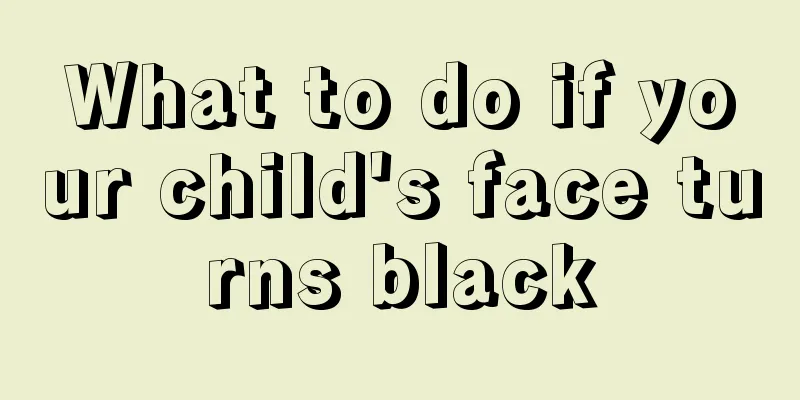What to do if your newborn baby eats too quickly

|
In our lives, there are many mothers with very abundant milk, so it is easy for the baby to choke when feeding. Sometimes the baby may eat milk too quickly. In this case, mothers can pinch their nipples and try to control the flow rate of milk to let the baby eat slowly. Because eating too fast will not only make the baby eat gas in the stomach, but also difficult to digest. So what should I do if the newborn eats milk too quickly? What to do if your baby feeds too quickly 1. If your breasts are not swollen and hard, pinch the nipples with your index and middle fingers, and tighten them when you need milk to come out, to control the flow of milk. If your baby is drinking milk powder, you can try changing the hole of the nipple to a smaller one. This way, the baby will drink more slowly. In fact, it is okay as long as the baby does not choke. After eating, just pat the baby's back to help him burp. 2. Let your baby eat a little less each time, and eat small and frequent meals. After each feeding, hold the baby upright on your shoulder and gently pat the baby's back until you hear a hiccup, then gently put the baby down. If the baby eats too quickly, there will usually be slight spitting up of milk. Expectant mothers need to find out whether the baby is spitting up milk or spitting up milk. The amount of spitting up is relatively large, and may occur shortly after feeding or half an hour later. Before spitting up, the child will open his mouth and stretch his neck, with an expression of pain and discomfort. The amount of milk spitting up is small and usually occurs right after a meal. It usually stops after one or two mouthfuls. Spitting up is a common phenomenon in infants. There are two reasons for this: one is that it is a symptom of systemic or gastrointestinal disease; the other is that the anatomical and physiological characteristics of the infant's gastrointestinal tract make vomiting prone to occur. Generally speaking, vomiting caused by the second reason is more common. If a child spits up milk occasionally and is in good spirits, he or she may not be sick. If the child vomits several times in a row and vomits every time during feeding, you should pay attention to whether the child has a fever, the condition of his bowel movements, any changes in his spirit, etc. There may be problems with the gastrointestinal tract itself, or there may be lesions in other systems. You should take your child to the hospital for examination. Spitting up is usually caused by the baby taking in air while feeding. After the air enters the stomach, because the gas is lighter than the liquid and is located at the top, it can easily break through the cardia and come out, and it will also bring out some milk, thus causing milk regurgitation. Therefore, when feeding, let the child's mouth cover the entire nipple, leaving no gaps to prevent air from entering. When feeding with a bottle, the milk should completely fill the nipple. Don't be afraid that the milk will be too strong and only reach half of the nipple, as this will make it easy for the baby to inhale air. After feeding, it is best to let the child lie on the adult's shoulder and pat the child's back with your hand to allow the inhaled air to escape. After feeding, be gentle and use less movement when picking up and putting your baby down. If you shake your baby too vigorously, it will be easy for the milk to spill or spit up. The amount of milk that regurgitates is generally small and will not have much impact on the child's growth and development. It will get better naturally as the baby gets older. |
<<: Neonatal stool occult blood positive
>>: What is sleepiness in newborns?
Recommend
Baby oral care should be done this way to be effective
We all know that children need to brush their tee...
What should I do if my child has white spots on his throat?
In today's society, most people, whether fath...
What are the treatments for children's itchy throat and cough?
Children always feel that their throats are very ...
What happens when a baby hits his head with his hands?
Children will exhibit various behaviors as they g...
Is myocardial injury in children easy to treat?
I believe that the health of their children is wh...
What should I do if my two-month-old child is constipated?
Children need to defecate every day. If they do n...
How to treat baby tooth decay?
Children do not take good care of their oral cavi...
What is the reason for the baby to cry suddenly during the day?
The crying of a baby usually gives us certain clu...
Why is the newborn baby's hair yellow?
I believe many people have seen that the hair of ...
What to do if your child is picky about eating
Raising a child is a long process. As the saying ...
Why does a child sweat on his head when sleeping at night?
We all know that sweating is actually a nerve ref...
What is the timing of teeth replacement for children?
Many parents may think that children's tooth ...
What is the reason why babies sweat and wet pillows when sleeping?
Babies sweat a lot when they sleep, even their pi...
What to do if your baby picks his nose
Many babies often pick their noses, and many pare...
What to do if your baby has a fever and his hands and feet are hot
When a baby has a fever and his hands and feet ar...









